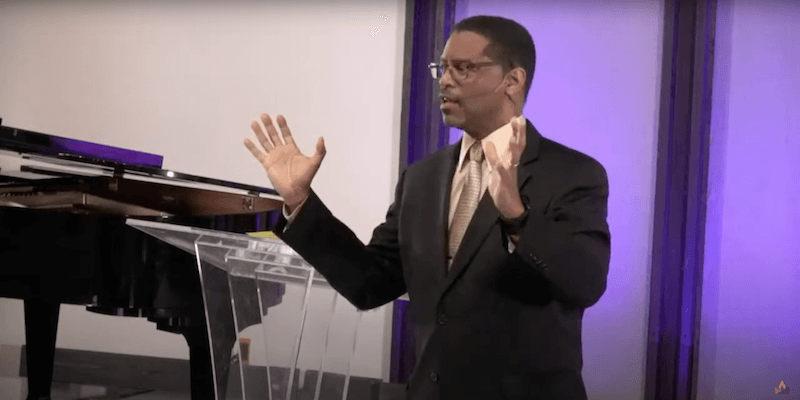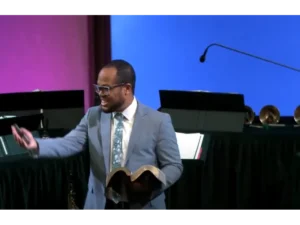We continue our new series on the book of James–a straight-forward, user-friendly “manual” on Faith that Works. Why do we need a faith that works? Because only a working faith can endure the times of trouble now and in the future.
The author is James, the half-brother of Jesus. (See 1 Cor. 15:6-8; Gal. 1:19.) The purpose of the letter is to encourage and develop mature Christianity. It is rated G for Grown-ups. Mature Christians love God, obey God’s laws, and love their neighbor in tangible ways.
James begins his letter with a discourse on how to live with faith and trials. Rewind to James 1:2 – “Consider it pure joy, my brothers and sisters, whenever you face trials of many kinds…” James literally says, “count all the joys”—count every happiness when you endure trials. Resist the pain and depression of the trial by deliberately choosing praising over pouting.
Every token of God’s favor, no matter how big or small; every act of grace on your behalf; every blessing, every answered prayer, every moment of joy and opportunity and affirmation—think on these things. And if your life has been filled with more negative than positive and you have more sorrows than joys, then focus your praise on what Jesus did for you on the cross and eternity itself won’t be long enough for all you have to thank Him for.
There’s another reason to count all the joys: “because you know that the testing of your faith produces perseverance. Let perseverance finish its work so that you may be mature and complete, not lacking anything.” (1:3-4)
But we’re not mature and complete yet, right? That’s why James goes on to say: “If any of you lacks wisdom, he should ask God, who gives generously to all without finding fault, and it will be given to him.” (vs. 5)
James links verse 5 with verse 4 by use of the words lacking and lacks. God’s goal for all of us is that we lack nothing. James tells us to look forward to the day when we are fully mature in Christ, knowing we are not there yet and aware that there’s at least one thing we lack that prevents us from seeing life as he has portrayed it—wisdom. Wisdom is essential for enduring the trials of life with joy and reaching maturity as a Christian.
The Greek meaning of wisdom is a knowledge (mostly philosophical) of things divine and human. But James is Jewish, not Greek. For him, wisdom is practical not theoretical. Wisdom is knowledge applied appropriately to produce a godly outcome. It’s not only knowing what but understanding how to do the right thing with that knowledge.
This wisdom is described in the introduction to Proverbs, the Bible’s premier book of wisdom. “…for gaining wisdom and instruction; for understanding words of insight; for receiving instruction in prudent behavior, doing what is right and just and fair” (Prov. 1:2-3).
If you lack this wisdom, ask God for it, says James. And the asking is continuous just as Jesus taught in Matt. 7:7-11: “Ask and keep on asking.” Why do we have to keep asking? Because the trials keep coming. And we need fresh wisdom for each situation and circumstance we face.
When asking for wisdom the seeker must remember two things:
- How God gives
- How to ask – without doubting
God gives generously (“without mental reservation”). God is a lavish giver. (See John 3:16; Rom. 8:32; Eph. 1:7-8.) God is an extravagant giver and does not criticize us for asking. God gives without grumbling so we should ask without doubting. Otherwise, we limit God! That’s right. The way God meets our request is limited, not by Him, but by our lack of faith.
Rewind to Mark 10:49-52 for an example of how we’re to ask in faith. Bartimeus was persistent and threw his cloak aside before Jesus healed him—an act proving he had full confidence he wouldn’t need it after encountering Jesus! That’s what it means to ask without doubting.
Doubters are tossed at the mercy of the wind instead of secure in the mercy of the Lord. (Rewind to James 1:6.) Too many of us are being wind-blown—more driven by adverse circumstances than by the faithfulness of God’s promises to never leave or forsake us. Which means we have more faith in the crisis than in the Creator. The Wind is more real than the Word.
This is a double-minded person (verses 7-8), which means “two-souled” or “double-spirited.” It’s not two-facedness as we use that expression in English, not duplicity, but of two different opinions at the same time.
This doubting and doublemindedness is the opposite of the maturity in vs. 4. It is deliberately contrasted against the attitude of God in verse 5. God is fully committed to our growth and development. But in contrast, verses 6-8 raises the question of whether we want to grow forward with God. God’s mind is clear; but are we doubleminded? Faith is our absolute confidence that he will give what we ask; doubting is our own inner uncertainty about whether we really want him to give or not.
The question we must ask ourselves is with a God so willing to give so freely, why are we content to ask for so little? Do we want a faith that works? The winds of trial and tribulation are going to blow. Nothing you can do about that, but the wisdom to keep your focus on Jesus will keep you from sinking beneath the waves. May God give us all more wisdom this week
Pastor Randy Maxwell




